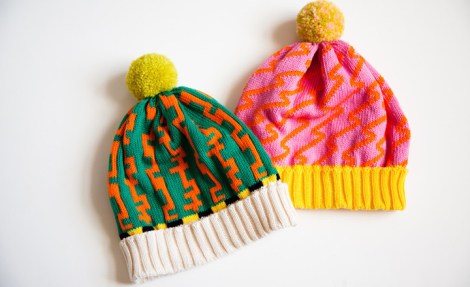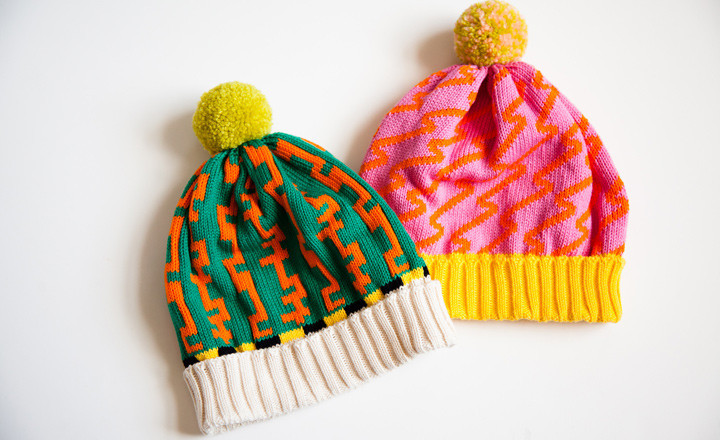
Jamie BeckHats by All Knitwear courtesy of Of a Kind.
Your favorite clothes always have stories attached. Like your best-loved jeans with the soft knees from hours of gardening or that shirt you wore on the blind date with the weirdo from the wine futures business who ended up becoming your husband.
But what about your clothing’s story before it ever held your body and softly whispered “Pinot Noir 2007” into your ear? Aside from that tiny “Made in Indonesia” tag, our clothing rarely tells us where it’s been, who made it, or how it was dreamed up.
Telling those tales is the inspiration behind the online apparel hub Of a Kind, which connects shoppers with small-time, and often sustainable, clothing makers. Working under a philosophy similar to the “know your farmer” creed of the food movement, the site aims to make “people feel like they’re investing in a person and not just buying a necklace or a bag,” says President and Cofounder Erica Cerulo.
Here’s how it works: Of a Kind works with a designer to release tiny batches of clothing or accessories that are usually made in the U.S. and often handmade. Alongside its wares, the site gives glimpses inside the designers’ studios and creative processes.
A piece about Canoe’s Natalie Davis offers a suggested playlist for leatherworking (hint: Willie and Waylon) with her vegetable-tanned black buffalo wallets. In God We Trust’s Shana Tabor walks readers through the steps for making her brass cuffs. Astrid Chastka and Kalen Kaminski, of clothing label Upstate, give a tour of their tie-dyeing process, as well as their tiny studio, which doubles as Kaminski’s apartment. Forage’s Stephen Loidolt and Shauna Alterio not only show how they make their bow ties, they share their bow-tie wearing icons and origin story. Handbag designer Anna Lynett Moss talks about what it’s like to teach fashion theory to prisoners on Riker’s Island.
Putting faces to fashion — and showing how much work goes into a well-made product — could be critical for slowing overconsumption and bad practices in the fashion world. And the stories can also help indie, conscientious designers survive in a world full of cheap clothing.
So far, the approach seems to be working. According to an onsite survey, 85 percent of customers read the stories that go with the products. Many of the designers have picked up international distribution or gotten orders from big names like Madewell, Anthropologie, and Saks Fifth Avenue, according to Cerulo. While that seems like a step in the wrong, mass-produced direction, Of a Kind is also piloting a solution. A new offshoot of the site allows designers to sell their full collections, which could take much of the headache out of trying to shop indie designers.
And Of a Kind popped up at exactly the right moment. Just like the good food movement, there is a growing desire within fashion to know more about where our goods come from.
Granted, when you translate “know your farmer” to “know your designer,” you’re bound to see fewer urban farmer tans and more of the bougie and the Brooklyn. While Of a Kind keeps prices under $500, price tags are still high above what you’re likely used to paying. For example, the hats in the photo above retail for $44 each, while Urban Outfitters beanies usually cost less than $20.
But investing in the cool kids still beats leaving your purchases’ pasts in the dark and just hoping your clothes weren’t made by actual children.
“We love a bargain as much as the next person,” says Cerulo, “but we also think that it’s super important for shoppers to understand that if a dress costs $20, someone is probably getting screwed along the way.”




